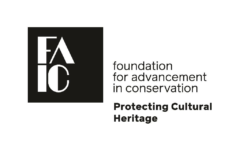- Decolonizing in Collections Care
November 16, 2023
- Fire Suppression for Museums
October 10, 2023
- The Poison Book Project
September 20, 2023
- Arsenic in Collections
September 6, 2023
- Care of Tin-Mercury Amalgam Mirrors
July 19, 2023
- How to Manage Volunteers in Collections
August 9, 2023
- CCAHA Collections Management Policy Toolkit (CMPT)
June 7, 2023
- May Day 2023 Where to Find Aid and How to Get Training for Disasters
May 2, 2023
- Care of Judaica
April 3, 2023
- Exhibiting Photographs
March 21, 2023
- A Discussion of Cold Storage Theory and Practice for Photographic and Paper-based Records
February 16, 2023
- Sustainable and Passive Ways to Improve your Collection Environment
January 26, 2023




